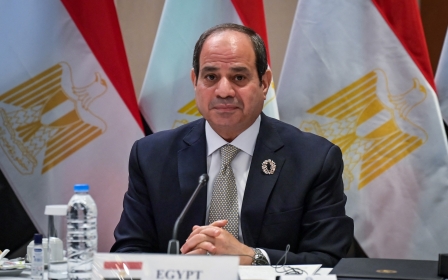Egypt to offer military-owned firms on stock market this year

Egypt intends to list military-owned companies on the stock market before the end of 2022, as it grapples with the economic impact of Russia’s invasion of Ukraine.
Egyptian President Abdel Fattah el-Sisi made the announcement Tuesday night in a speech where he laid out plans to boost private sector participation in state-owned companies. He said that the privatisation drive would aim to raise $10bn annually for four years.
Egypt has been hit hard by the war, which has driven up food and energy prices and curtailed the flow of visitors from Russia and Ukraine, two of the largest markets for Egypt’s tourism sector.
The country is especially vulnerable to the rise in wheat prices. In 2021, it imported around 80 percent of its supplies from Russia and Ukraine.
According to even government-owned newspapers, the latest figures from the country’s statistics agency showed the overall inflation rate in Egypt jumping to 12.1 percent in March, compared to 4.8 percent in 2021.
Egypt’s economy has historically been dominated by state and military-owned companies, whose business interests stretch from the construction and telecom industries to grocery chains.
In 2018, the government announced it would sell minority stakes in 23 state-owned companies, and the following year Sisi promised to put shares of military firms on the stock exchange.
Despite repeated pledges to increase the role of the private sector in Egyptian economic life, many analysts say that under Sisi’s watch state control of the economy has increased, with the military at the forefront of driving out private competitors.
The economic challenges caused by the war in Ukraine and the tightening global monetary conditions that are rippling through other emerging market economies could provide new impetus for Cairo to enact the long-delayed plans.
For years, Egypt has offered investors some of the world’s highest interest rates in order to attract money into its short-term debt market and support its foreign currency reserves. Following Russia’s invasion of Ukraine, there was a stampede of foreign investors from the treasury market.
In March, Egypt was forced to devalue its currency by 15 percent and the country is currently seeking new support from the IMF.
Middle East Eye propose une couverture et une analyse indépendantes et incomparables du Moyen-Orient, de l’Afrique du Nord et d’autres régions du monde. Pour en savoir plus sur la reprise de ce contenu et les frais qui s’appliquent, veuillez remplir ce formulaire [en anglais]. Pour en savoir plus sur MEE, cliquez ici [en anglais].





